The relationship between clutter and mental health is simple. When clutter is winning, mental health is losing. Eliminating clutter will improve your mental health.
Sure, there are plenty of greater issues mounting up that can disturb your peace of mind – climate change, COVID-19, escalating global violence, and more. You can feel powerless over many of these plights. Clutter may seem trivial by comparison, but it’s something you can fix. It’s also a 100-percent preventable drain on your well-being. Consider the negative impact of clutter in your space, the benefits of decluttering, and how to clear away excessive “stuff.”
The consequences of clutter on your mental health are many and significant.
It impairs memory, leads to poor eating habits, and decreases impulse control. Clutter increases the risk for developing mood disorders and interferes with concentration and decision-making. It also stunts creativity, lessens your productivity, and saps your energy.
Think of the time you spend looking for lost items, or buying new ones because searching through the clutter is overwhelming. It robs you of five percent of your time. What is five percent of your income? That’s what your clutter is costing you.
Clutter makes communication difficult and can even damage or destroy relationships. When an environment is highly cluttered, people are distracted by random visual stimuli in the room, interfering with reading the expressions and emotions of the people in the chaotic environment.

Multiple studies show that our living space is a “psychological home.” We want, and need, to experience it as a place of comfort and security. It’s an extension of your identity to which you form an emotional bond.
Research published in the Journal of Environmental Psychology studied the factors that detract from and contribute to the psychological home. Author Catherine Roster, a professor at the University of New Mexico’s Anderson School of Management, found that possession clutter has a profoundly negative impact on a sense of psychological home.
Decluttering has powerful, positive impacts on mental health, more than you expect. Some of the greatest benefits include:
- Boosts mood – the act of decluttering relaxes your mind.
- Improves physical health – eating habits improve, combatting the association between clutter and becoming overweight.
- Escalates the ability to focus, which prepares your mind to perform tasks.
- Increases productivity – visual accomplishment is rewarding.
- Relieves anxiety – having clutter makes you fear more clutter.
- Improves sleep – an organized environment increases sleep quality.
- Improves relationships – communication is more effective.
How do you get organized?
Start small. An entire house, or an entire room, can be overwhelming. Enjoy even the small success of organizing a drawer or shelf. Listen to music or an audiobook while you work.
Set aside specific time for decluttering. In advance, ponder how good it will feel to have an organized space, and what better purpose it can serve.
Sort items into categories. Designate items to keep, discard, donate, and relocate. You may want to store sentimental or seasonal items at another site, such as a storage space.
Do digital decluttering. Do not try to go through hundreds of emails in one sitting. Tackle a few per day.
Do not touch every item, contemplating its fate. It just increases your attachment to each thing. In 2010, Marie Kondo started a clutter-clearing movement, touting a method of holding each item and discarding everything that doesn’t bring you joy. After her third child, she declared that she was giving up tidying every day. Kondo said time for her children is more important. She’s right.
What are some ways you have decluttered? If you have your own suggestions that proved valuable, please share them with the StudyFinds community in the comments below!
You might also be interested in:

This is great. Right away I wanted to print it out and add it to the clutter of the other printed out items but then said to myself “self you’re just adding to the clutter”
hmmm
Omg so true 🤣 I’ll add to my pile of inspirational articles that I won’t follow thru on
where is the like button … I wanted to save the article!!
Save Time. Do not make your bed you will only have to do it again tomorrow. Time saved over adult lifetime based on 10 min of bed making is more than 150 days of bed making over a life time ( 10min x 365 days x 65 years). Stop folding and putting away your clothes. You probably save a year of your life. YES I LOVE MY CLUTTER!
And you will be delighted with living alone your entire life!
I wish ! Solitude Rules ! !
I use a down comforter with a duvet cover. Takes 10 seconds to make the bed.
I put my often worn clothes in bins. 1 for socks & underwear, 1 for t shirts, 1 for pants, 1 for cold weather hats, gloves etc. Putting away clean clothes takes 5 mins.
Easiest way to make your bed is to sit up and back up to your pillows pulling your sheets and blankets up to your waist, pivot your legs off the bed, stand up and flip your bedspread over your pillows etc.
Learned this from being in an upper bed in college.
I assure you that climate change and covid-19 are not remotely worrisome. Indeed, nobody should be worried about these strawmen.
I stopped reading the article at Covid-19. Anyone who is still obsessed with that has other issues.
Dana K. White, of A Slob Comes Clean, has fabulous strategies for clearing the clutter, which she outlines in her 5 Step Decluttering Method. She has a no mess decluttering strategy that doesn’t add to the mess if you get stopped part way through.
I second Dana K. White’s strategies. Work one small area at a time. Don’t drag everything out. “Take it there now!” You can find her on YouTube.
Sort clothing by color. Example: take out all black tops; count them. Let’s say you have 60. Pair down to 20, 10 for spring/summer, 10 for fall/winter by occasion (casual/dressy),get rid of worn out,faded,or tops that don’t fit. Repeat the process with jeans etc. Also can do this with kitchen items. Eliminated chipped dishes, mugs and duplicate items.
Thank you !
At age 84 I was born after the Depression, but Mama was there and Granny was there.
They never threw anything away, no matter how worn or broken because it might
come in handy someday, maybe as filler or patch material for repairing something else.
I learned from them . . .
Declutter a small area at a time. Star5 in smallest room, in bathroom, then closets. But a bag for donations, trash. I use a new mop bucket too put items in that need too be sorted out more closely. I do that after eating dinner.
Why bring up COVID-19 at this point? When I saw thought, I assumed the article was a few years old. Time to move on.
They are deranged
I recently went down to part time. I have been going through this house like mad. l have taken stuff out like you wouldn’t believe. I have containers ready. I load my car up the same day and take it to a donation center. No second thoughts. The more you get rid of the easier it gets.
Hoarding. It’s a mental disorder.
When I was in college, I had a roommate who I found cleaning our house in a panic when he found out his parents were visiting on short notice. I asked him, “why?” He said it was because he parents saw clutter, mess and disorganization as a sign of mental illness. I laughed. But, 25 years later, I think they were onto something.
Clutter doesn’t make the mind unwell. An unwell mind makes things cluttered.
Being a slob & hoarding are not the same thing.
Agreed
It’s unfortunate if some readers choose to discredit an entire article simply because it mentions COVID-19. However, it’s essential for writers to navigate such sensitivities thoughtfully, ensuring that any references to COVID-19 are relevant. While COVID-19 is a REAL virus with significant health implications, the narratives surrounding it encompass a wide range of interpretations & perspectives. This is article is good advice
Funny how the far Right chides everyone about being snowflakes, but one mention of a few hot button words, like Covid or Woke has them flaring up like rattlesnakes ready to strike. So tired of it.
I recently went down to part time. I have been going through this house like mad. l have taken stuff out like you wouldn’t believe. I have containers ready. I load my car up the same day and take it to a donation center. No second thoughts. The more you get rid of the easier it gets.
I have two grown sons, one a neat and organized person who struggles with personal success, one a completely disorganized person, yet very accomplished in his career. Both loving and caring people with alcohol addictions.
I’m 76 and have regrets about how I raised my children about clutter. I shamed my youngest son about what I perceive as messy habits. Now I see a brilliant mind with a focus that was not my focus. I paid forward my family’s shaming. Guess what? It didn’t work.
I completely agree that clutter makes you feel badly about yourself and I ask the question, is it because of shaming?
From my perspective clutter could be a
result of a mind focused on something else outside my perception.
My solution, get help with the clutter if it bothers you or if it is getting in the way of happiness and relationships. Hire a housekeeper to clean up and work towards organization. Most importantly, you are not a less than desirable person, it is just that your disorganization is visual and easily judged.
Look to nature. A pile of leaves can be seen as litter or compost. Look deeper and you will see more than clutter.
When I know I need to tackle something that I feel is overwhelming I set a timer and just work on it for 10 or 15 minutes. It’s surprising how much I can get done in that time and it feels good. And usually starting the job is the hardest part but 15 minutes or even 10 minutes is a step in the right direction.
I declutterred recently. I got rid of the “technology box”, all the old cables, adapter, power cords, cell phones, I had so much I could open a Radio Shack. Then moved on to the coffee cups. I must have 50. They came from gifts, companies I worked at etc… I recently changed my internet company and they gave me a coffee cup! Haha!
I personally have become a minimalist after cleaning for more than 30 years. After dusting woman’s stuff and other people’s clutter I decided that I didn’t need stuff to make me happy. But being organized and letting go of things that don’t serve you is very freeing !!!!! Make more memories with your families and quit buying things you think you need.
I only handle my mail once. I either discard it, pay the bill or set it aside for reading later. I have no pile of mail anywhere in my house.
The opposite of clutter is an obsessive compulsive disorder, OCD.
It can be more destructive than being a packrat.
“The Odd Couple” has fun with this. In real life, not funny.
As long as the clutter does not create a fire risk or health hazard,
leave them alone.
The article alarmed me when she had her third child.
I was afraid she would give away her first one.